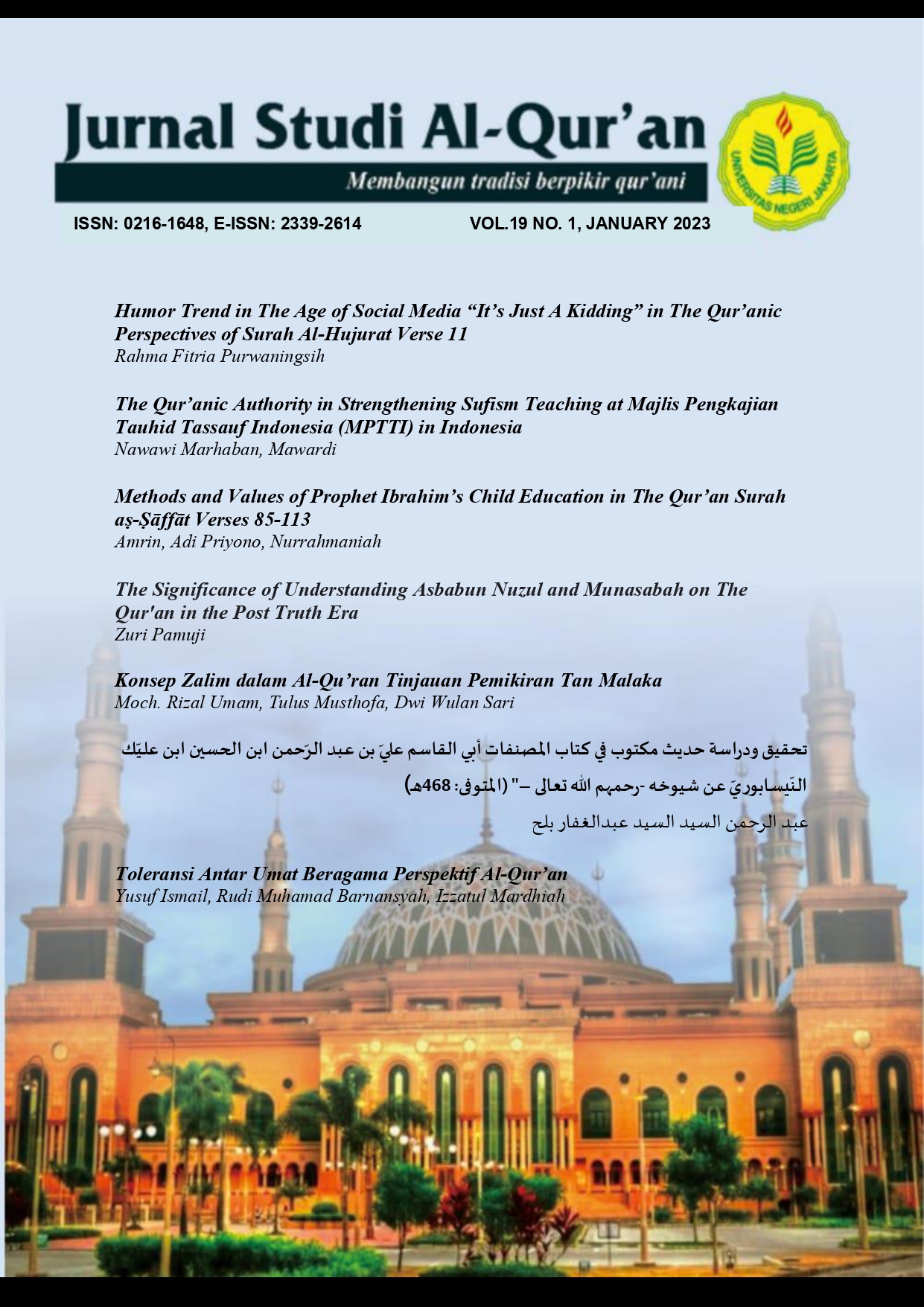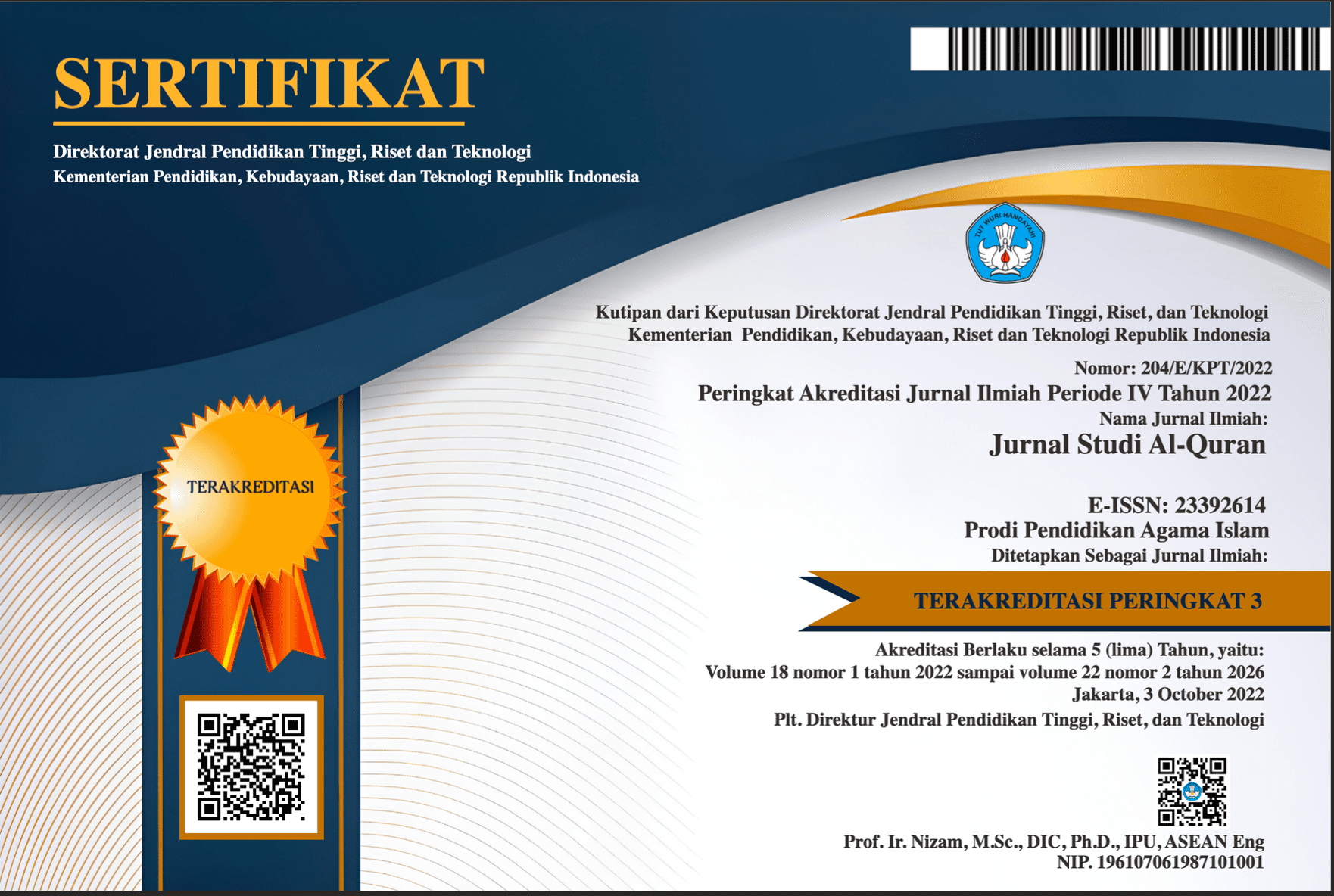The Qur’anic Authority in Strengthening Sufism Teaching at Majlis Pengkajian Tauhid Tassauf Indonesia (MPTTI) in Indonesia
DOI:
https://doi.org/10.21009/JSQ.019.1.02Keywords:
Al-Qur'an, Authority, Practice, Living Qur'anAbstract
The article overviewed the Qur’anic textual authority in practices and the concept of living in Qur’anic behaviours for Monotheism and Sufism, a council of study in Aceh province. As it is known for a board of study existence, Majelis Pengkajian Tauhid Tasawuf Indonesia (MPTTI) is growing more controversial regarding religious harmony in Islamic group society and its particular Sufism teaching. Nevertheless, despite these controversial phenomena, the council retains its teaching principles. The board exclusively refers to its teaching on Qur’an scriptures and verses as countermeasures of marginality and oppression. The committee believed in the authority of Sufism teaching, which was baselined on the Qur’an. The article projected how the council employs the scripture to formulate Sufism with a phenomenology approach to the engagement of living hadith in practice. Later, the board exploits the scripture as the source to establish critique for disavowing acceptance behaviours in society. The council intends to restore the communal into the proper stream of Islamic tradition. Parallel to these intriguing findings, the commission proclaims the Al Qur’an as an appropriate establishment of primary character reference. Eventually, the fascinating texts employed by the council also drive to strengthen the validity of council identity on national and even international coverage, which overlaps other boards in the region.
References
Al-Qaththan, Manna’. Mabahis Fi Ulum Al-Quran. Qahirah: Maktabah Wahbah, 1995.
Al-Wajri. Kamus Bahasa Arab-Indonesia. Surakarta: Mizan Press, 2001.
Azra, Azyumardi. Jaringan Ulama: Timur Tengah Dan Kepulauan Nusantara Abad XVII Dan XVIII: Melacak Akar-Akar Pembaharuan Pemikiran Islam Di Indonesia. Bandung: Mizan, 1994.
Bourdieu, Pierre. The Logic of Practice. California: Atanford University Press, 1990.
Bugti, Nayab Aziz, and Fouzia Rehman Khan. “Doctrine of Fana and Baqa of Sufism in Shafaks The Forty Rules of Love: A Content Analysis.” Global Language Review IV, no. I (June 2019): 28–34. https://doi.org/10.31703/glr.2019(IV-I).04.
Dewi, Subkhani Kusuma. “Otoritas Teks Sebagai Pusat Dari Praktik Umat Islam.” Jurnal Living Hadis 1, no. 1 (2016): 197–221. http://202.0.92.5/ushuluddin/Living/article/view/1074/980.
Effendi, M. R., Ismail, Y., Darma, S., Wulandari, D., & Adzra, Z. (2022, July). The Theology Of Entrepreneurship: The Identity Of The Millenial Muslim Student Entrepreneurship Movement In Universities. In Proceeding International Conference on Islam and Education (ICONIE) (Vol. 2, No. 1).
Hakam, A., Anggraeni, D., & Fadhil, A. (2020). Pola dan Narasi Gerakan Keislaman di Universitas Negeri Jakarta. Hayula: Indonesian Journal of Multidisciplinary Islamic Studies, 4(2), 263-278. https://doi.org/10.21009/004.2.07
Hakiki, Kiki Muhamad. “TASAWUF WUJŪDIYYAT: Tinjauan Ulang Polemik Penyesatan Hamzah Fansūrī Oleh Shaykh Nūr Al-Dīn Al-Ranīrī.” Jurnal THEOLOGIA 29, no. 1 (September 2, 2018): 25–58. https://doi.org/10.21580/teo.2018.29.1.2400.
Ichwan, Mohd Nur. “Neo-Sufism, Shariatism, and Ulama Politics: Abu Shaykh Amran Waly and the Tauhid-Tasawuf Movement in Aceh.” In Islam, Politics and Change, edited by Kees van Dijk and Nico J.G. Kaptein, 231–32. Leiden: Leiden University Press, 2016.
Jatmiko, Ruruh, and Muhammad Abdullah. “Habitus, Modal, Dan Arena Dalam Cerbung Salindri Kenya Kebak Wewadi Karya Pakne Puri Tinjauan Bourdieu.” Sutasoma : Jurnal Sastra Jawa 9, no. 1 (July 2021): 100–115. https://doi.org/10.15294/sutasoma.v9i1.47060.
Junaedi, Didi. “Living Qur’an: Sebuah Pendekatan Baru Dalam Kajian Al-Qur’an (Studi Kasus Di Pondok Pesantren As-Siroj Al-Hasan Desa Kalimukti Kec. Pabedilan Kab. Cirebon).” Journal of Qur’a>n and H}adi@th Studies 4, no. 2 (2015): 169–90. https://doi.org/10.15408/quhas.v4i2.2392.
Khatib, Muhammad Ajjaj al. Ushul Al Hadith Ulumuhu Wa Mutalahuhu. Bairut: Dar al Fikr, 2009.
Lukens-Bull, Ronald A. “Between Text and Practice: Considerations in the Anthropological Study of Islam.” Marburg Journal of Religion 4, no. 1–17 (1999). https://doi.org/10.17192/mjr.1999.4.3763.
Mahd Nor, Nor Izzati. “Pendidikan Islam Bagi Kanak-Kanak Berkeperluan Khas: Guru Sebagai Murabbi.” Journal of Quran Sunnah Education & Special Needs 5, no. 1 (June 2021): 64–76. https://doi.org/10.33102/jqss.vol5no1.92.
Metcalf, Barbara D. “Living Hadīth in the Tablīghī Jama’āt.” The Journal of Asian Studies 52, no. 3 (August 23, 1993): 584–608. https://doi.org/10.2307/2058855.
Nasir, Mohd., and Mawardi Mawardi. “Negotiation of The Ma’rifah Community Identity In Forming Sufistic Sholihan In Seuruway Community of Aceh Tamiang.” Jurnal Ushuluddin 28, no. 1 (June 2020): 99. https://doi.org/10.24014/jush.v28i1.7050.
Pal, Mahesh Chandra, and Rahul Patel. “Exploring Little Traditional Medicine of the Gond Tribe through Anthropological Lens.” Asian Man (The) - An International Journal 16, no. 1 (2022): 79–89. https://doi.org/10.5958/0975-6884.2022.00009.3.
Qudsy, Saifuddin Zuhri. “LIVING HADIS: GENEALOGI, TEORI, DAN APLIKASI.” Jurnal Living Hadis 1, no. 1 (December 6, 2016): 177. https://doi.org/10.14421/livinghadis.2016.1073.
Roifa, Rifa, Rosihon Anwar, and Dadang Darmawan. “PERKEMBANGAN TAFSIR DI INDONESIA ( PRA KEMERDEKAAN 1900-1945).” Al-Bayan: Jurnal Studi Ilmu Al- Qur’an Dan Tafsir 2, no. 1 (June 27, 2017): 21–36. https://doi.org/10.15575/al-bayan.v2i1.1806.
Salam, M. Isa H A. Metodologi Kritik Hadis. Jakarta: Raja Grafindo Persada, 2004.
Stanford, Mark, and Harvey Whitehouse. “Why Do Great and Little Traditions Coexist in the World’s Doctrinal Religions?” Religion, Brain & Behavior 11, no. 3 (July 3, 2021): 312–34. https://doi.org/10.1080/2153599X.2021.1947357.
Sufyan, Muhammad Suhaili, Zulkarnaini Zulkarnaini, and Mawardi Mawardi. “Employing Politics of Identity and Nurturing Religious Piety: An Experience of the Majelis Pengkajian Tauhid Dan Tasawuf Indonesia in Aceh.” Teosofi: Jurnal Tasawuf Dan Pemikiran Islam 10, no. 2 (December 20, 2020): 283–301. https://doi.org/10.15642/teosofi.2020.10.2.284-302.
Downloads
Published
How to Cite
Issue
Section
License
Authors who publish with this Journal agree to the following terms:
- Author retain copyright and grant the journal right of first publication with the work simultaneously licensed under a creative commons attribution licensethat allow others to share the work within an acknowledgement of the work’s authorship and initial publication of this journal.
- Authors are able to enter into separate, additional contractual arrangementfor the non-exclusive distribution of the journal’s published version of the work (e.g. acknowledgement of its initial publication in this journal).
- Authors are permitted and encouraged to post their work online(e.g. in institutional repositories or on their websites) prior to and during the submission process, as it can lead to productive exchanges, as well as earlier and greater citation of published works.
Users/public use of this website will be licensed to CC BY










